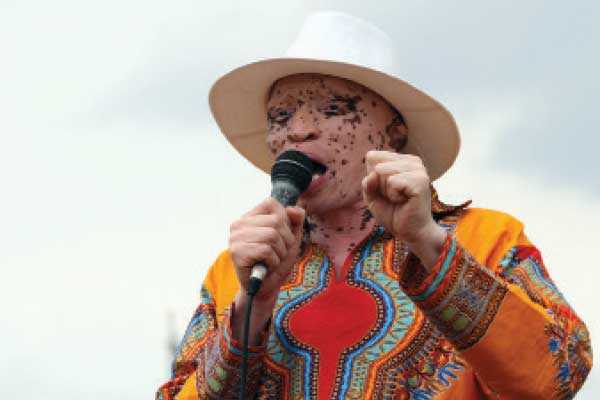Stop the stigma against Albinos– Kgosietsile
The stigma and prejudice associated with the condition of albinism has to stop. It's inhumane,"says Councillor of Marulamantsi Ward and Chairman of the Albinism Society of Botswana (ASB) Sergeant Kgosietsile.
He was speaking at a leadership workshop for people with Albinism which began at Sedibeng Lodge on Wednesday. The three-day workshop, organised by the ASB and sponsored by the German Embassy is aimed at empowering people with albinism with public speaking, research, advocacy, and assertiveness and confidence skills.Kgosietsile said people with Albinism needed to be empowered with education, among other things, not just to prosper, but to also come to the fore and get help with accepting their condition, as self-esteem is one of their greatest challenge. Albinism, a congenital disorder in which people lack colour pigmentation in their skin, hair and eyes, affects about one in every 20, 000 people worldwide. It is most common in sub-Saharan Africa, where there remains great misunderstanding about people with the condition.
In some parts of southern and eastern Africa, body parts of those living with Albinism are believed to hold magical powers, and so they are hunted and killed by "Albino hunters”. Attacks have been reported in Tanzania, Burundi and Malawi. But even when they are not hunted, Kgosietsile said people with Albinism often face discrimination and ridicule within their own families and communities. Thulaganyo Perekisi (29) shared with Botswana Guardian the challenges he has endured in his day-to-day life: “As much as some family members accepted me from birth, it took my parents some time to truly accept me. It affected me because I needed them at that time, and I didn't have their support. But I couldn't blame them because they didn't understand what was going on with me.
I have experienced a lot of discrimination from our society and people who are uninformed about Albinism.”
As a primary school pupil, Perekisi said other kids stayed away from him because he was different from them and this affected his self-esteem. “I was called different names; some would call me "white spooky", and others would always tease me and call me ugly. At the time, I also didn't understand what and who I was until one day, a girl from my class reached out to me.“She asked me why I was casting myself aside from other kids, and I had to explain to her that it was because I was different. She was so young, and I was amazed with her mindset. She told me that people will always talk no matter what, but it's up to me to change their perception of me. Since then, I don’t let anyone treat me as though I am different from the rest of the people.“It's funny how dark-skinned people think they are better than Albinos, but we are all black.
I have come across people who would make derogatory remarks when they see me. It’s really frustrating because it shows how ignorant people can be.”Perekisi says there is need for a lot of awareness rising. “The organisations advocating for people living with Albinism or disabilities in general should take a different approach when raising awareness. Instead of mobilising each other, they should involve the society and provide necessary information to them” he said, adding, “We should not be made to feel self-conscious about who we are because that's how isolation begins”. Other challenges discussed at the workshop include eyesight problems, discrimination at the workplace but more pressing is climate change, which Kgosietsile said has affected persons with Albinism more, especially when exposed to the excessive heat the country has experienced recently.
“As an organisation we are concerned because not much is being done to protect our people. Climate change has adverse effects on people with Albinism. They are more prone to cancer of the skin,” he said. He pleaded with government to make available funds so that people with Albinism can buy and apply special lotions made for their skins.
He said: “Our skin is very sensitive to heat and recently we have seen a rise in skin cancers and many Albinos are dying because of this. By not availing these creams to us, government is ignoring a right to life of the Albino”.Kgosetsile also stressed that all kinds of nonsensical myths about Albinism should be debunked. “This event is aimed at creating awareness on the abuse which people with Albinism experience, and to help alleviate trauma experienced by them. We also want to provide support by educating society on issues affecting us,” he said.






